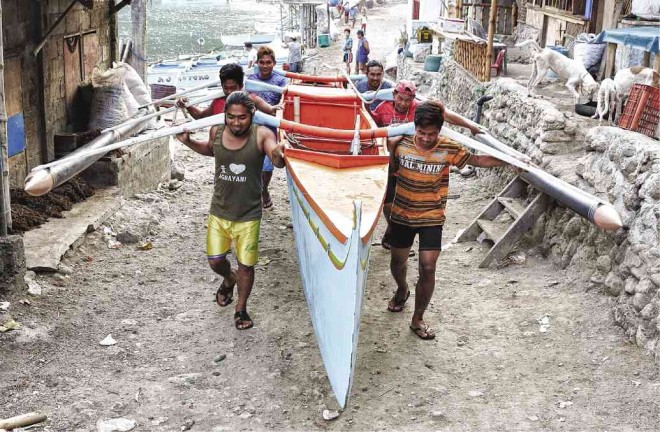Boats treated with care by valets in town

TEAMS of men in Olanen Cove in Bani town, Pangasinan province, work as parking boys, who take a share from a day’s catch in exchange for hauling up fishing vessels to shore. EV ESPIRITU/INQUIRER NORTHERN LUZON
BANI, Pangasinan—From 5 a.m. to 9 a.m. every day, the Olanen fishing village in Dacap Sur here comes alive with fishing boats docking on the shore.
Ready to meet them are wives, fish buyers and the “kadiya-kadiya boys,” a group of men who earns a living by parking boats.
These are professional “parking boys,” who work with precision and grace. Each time a fishing boat arrives, a team of six men wades through several meters of water to reach the vessel. They carry the boat over their shoulders from the water to the embankment, three men to each side of the boat. “Pulling the boat into the shore could destroy it because of the corals and stones,” said Jesus Navilgas, 49, head of Olanen Fishing Association.
This is why the services of the parking boys have become necessary for the fishing community, he said.
Some of these men prefer to be called parking boys because the Ilocano term “kadiya-kadiya” connotes begging or mooching. Parking, however, is a morning chore for them. In the afternoon, they ready the boats in preparation for a new day at sea.
“We supply the boats with gasoline, ice, batteries and coconut fronds before we carry these [vessels] to the water. During typhoon or high tide, we bring the boats to safe grounds,” said Leo Gutierrez, a 31-year-old kadiya-kadiya man.
The coconut fronds are an odd but interesting tool in the local fishing business.
Elpidio Angelito, who docks his fishing boat on Tubong Beach about a kilometer from the village, said the coconut fronds were attached to a rock.
When fishermen arrive at their destination in the sea, they put the fronds into the water to slow down the boat’s speed like an anchor to stabilize it as they catch fish. The kadiya-kadiya boys are entitled to a 10-percent share from the fishing vessel’s catch for their services.
The team usually sells the fish and divide the profits. There are four teams of kadiya-kadiya boys in the fishing village, said Arnel Magno, 29, a resident. The teams, composed of 10 to 12 men, have their suki (regular customers), he said. There are no qualifications for taking a job as a kadiya-kadiya boy, Gutierrez said, “for as long as one is physically fit and able to carry a boat and if one is willing to work at odd hours.”
The working hours vary according to the month, said Alex Delmo, 28, a resident. In May, the sea yields squid, and fishermen set out to sea at 5 p.m. They spend hours harvesting squid before heading back to shore the next morning.
September to December is tuna harvest season, so fishermen leave the port at midnight and return at 4 p.m. the following day. The kadiya-kadiya revenues also depend on the generosity of the sea.
A good day’s catch means each team member can earn up to P1,200 a day.
“It’s not a bad job: You already have money and you have fish. All you have to buy are rice and vegetables,” said Freddieboy Averion, 22. Rex Ortaleza, 31, had been working as a cook in Dubai, but returned to a career as a kadiya-kadiya boy because he found the job “satisfactory.”
The kadiya-kadiya business was not this organized before, they said. Men used to scramble each time a fishing boat docked. They were paid handfuls of fish after they carried a boat to shore.
“Some people would complain that they get less than the others. The fishermen would also complain that they are giving too much to the boys. That was why we decided to organize ourselves so there would be no more complaints and rivalry among us.” Magno said.














